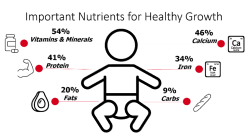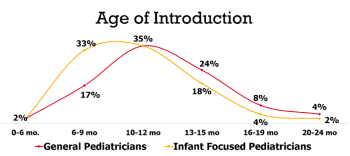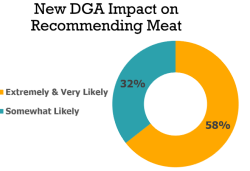Beef is an important complementary food for infants and toddlers during the first few years of life when rapid growth and development occur. Health authorities like the World Health Organization and the American Academy of Pediatrics recommend animal source foods, like beef, to ensure nutrient needs such as iron and zinc – are met1,2. Proper nutrition is critical during this time, particularly since by 6 months of age iron stores are depleted and breastmilk alone can no longer meet all of the infant’s nutrient requirements. The National Cattlemen’s Beef Association, a contractor to the Beef Checkoff, launched a research project to investigate physicians’ perceptions, benefits, and barriers to recommending beef to their patients 24 months or younger.

The research was conducted in January 2021 using an online quantitative survey of 433 physicians (M.Ds, D.Os, N.Ps and P.As). Two groups were analyzed to give depth and perspective to the discussion. Group one consisted of 209 physicians who currently have 30% or more of their patients between zero and 24 months old; while group two consisted of 224 physicians with 10% to 29% of their patients between 0 and 24 months old.
One of the major findings in the research was that while beef is not one of the first foods recommended, physicians are recommending nutrients that beef is either a good or excellent source in, iron, protein, vitamins, and minerals. When asked, 41% of physicians mentioned protein and 34% mentioned iron as important nutrients for healthy growth.

Even though recommendation of beef is later than other solid foods, the benefits of feeding beef in the earlier stages of a child’s life are realized by physicians. Over half of physicians said the top benefit of beef is its sources of key nutrients like iron, zinc and choline with 53% saying the nutritional value, which is similar to the consumer research done in August 2020 ARTICLE HERE. Despite recommendations that are consistent with the new DGA to introduce iron rich food sources3, like beef, starting around 6 months of age, this research showed that the majority of physicians are not recommending beef to patients until at least 10 months old. However, physicians who are more infant pediatric focused (more than 30% of their patients between 0 and 24 months old) are recommending beef be introduced earlier at slightly higher rates to younger children.
While physicians understand the benefits of beef and the importance of it in the early years, 40% are not recommending beef as a complementary first food to infants. Similar to consumers, the biggest barrier and concern is safety, specifically choking and digestion. Choking is the number one concern that physicians have about recommending beef as a complementary first food.

Only 36% of physicians were aware of the new dietary guidelines recommending meat as a complementary first food. Once physicians were aware of the new guidelines, 90% said the new guidelines would at least somewhat likely impact their likelihood to recommend meat as a complementary first food. Making more physicians aware of the new dietary guidelines could help them recommend more meat. When asked specifically what would make physicians feel more confident in recommending beef as a complementary first food, additional research, and studies in pediatric journals about beef’s value and decrease risk of choking, as well as recommendations from professional societies like the American Academy of Pediatrics would increase confidence. These societies and journals are where physicians go to for new research and recommendations.
“[Beef] packs in a lot of needed nutrients like iron, zinc; [it is] okay to start small amounts in puree with solids, usually around 9 months old.” – Direct physician quote
“Evidence that there are lots of good nutritional value in it without negative effects [would increase my likelihood to recommend beef]”
– Direct physician quote
To support the recommendations of beef earlier in development, physicians are looking for further evidence of beefs value, particularly research and studies, as well as recommendations from professional societies. Alleviating safety concerns, exposing more physicians to the benefits and studies behind beef as a complementary first food and making more physicians aware of the new dietary guidelines recommending meat as a complementary first food will be of utmost importance.
References
- American Academy of Pediatrics. Accessed March 30, 2021 https://www.healthychildren.org/English/ages-stages/baby/feeding-nutrition/Pages/Starting-Solid-Foods.aspx
- World Health Organization Guiding Principles for Complementary Feeding of the Breastfed Child accessed March 30, 2021: https://www.who.int/nutrition/publications/guiding_principles_compfeeding_breastfed.pdf
- https://www.dietaryguidelines.gov/sites/default/files/2021-03/Dietary_Guidelines_for_Americans-2020-2025.pdf
- Source: NCBA Early Years Physician Survey Results; January 2021